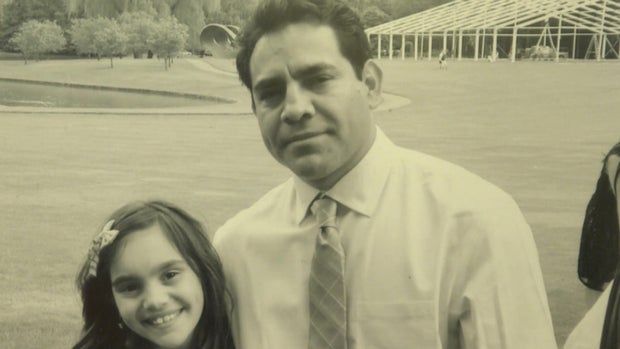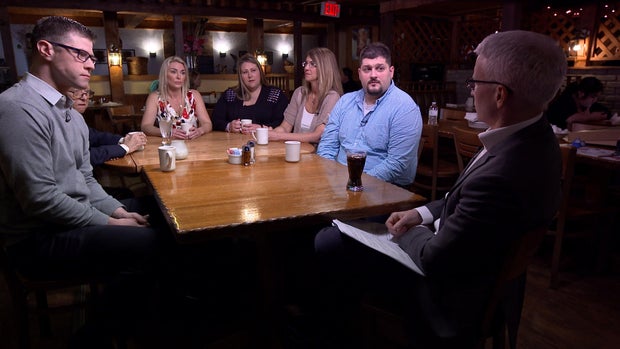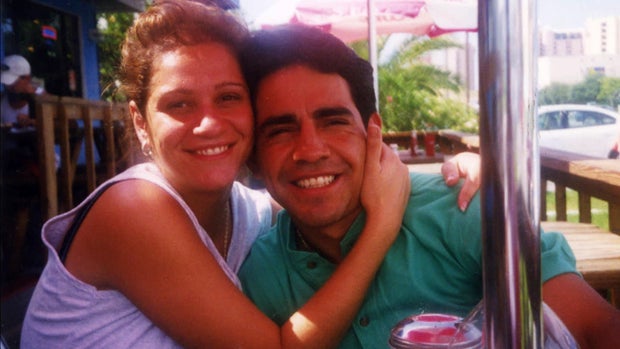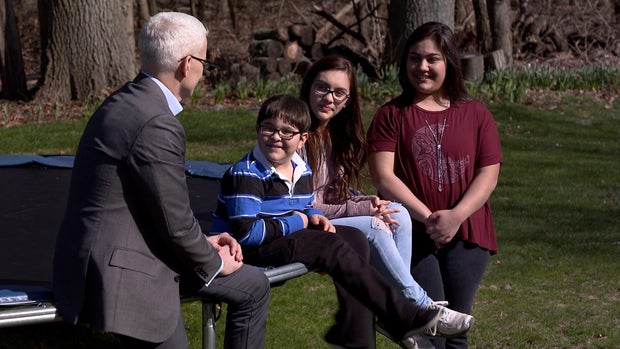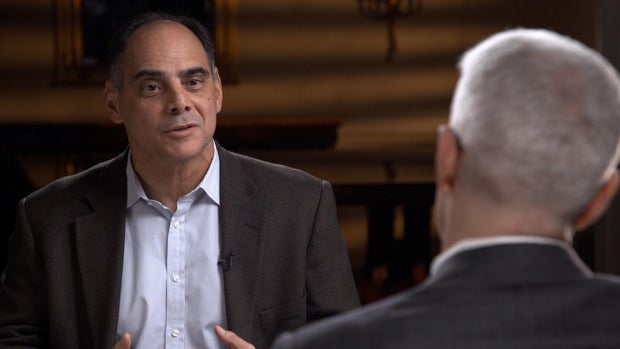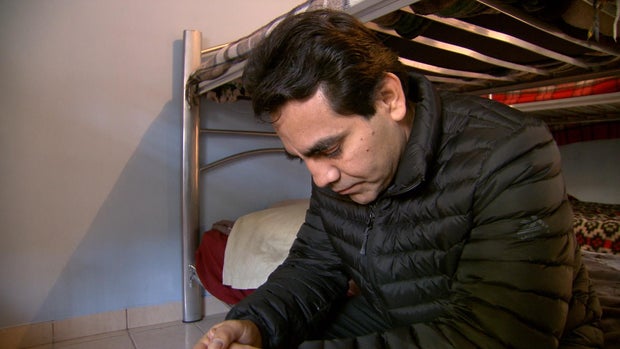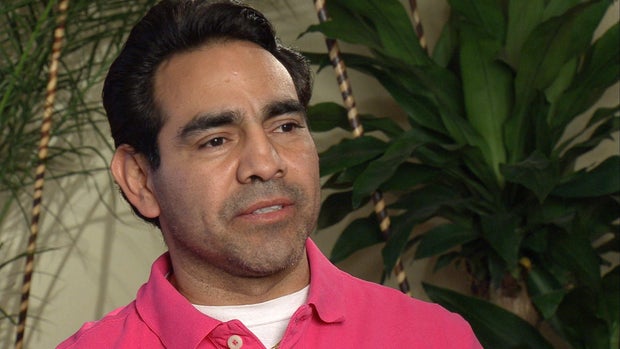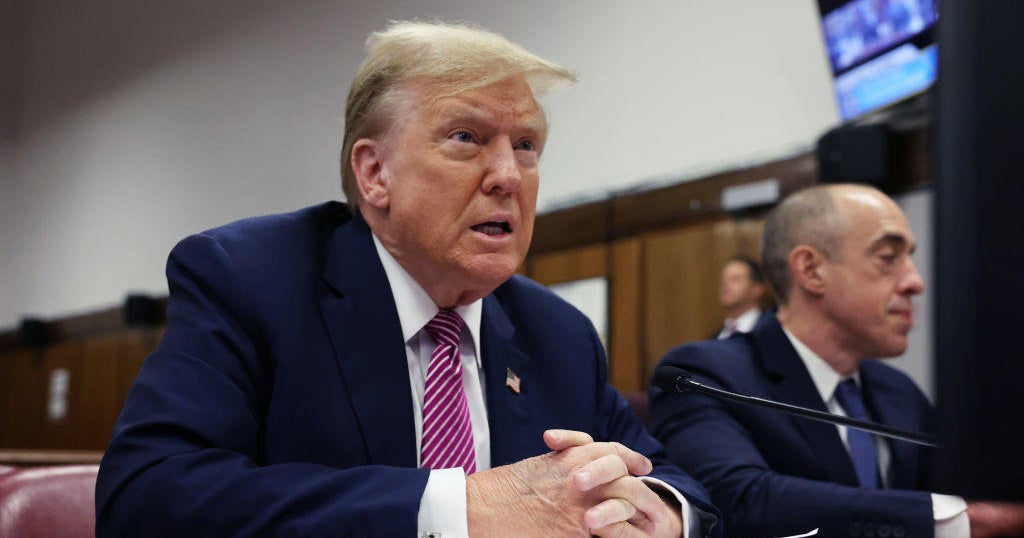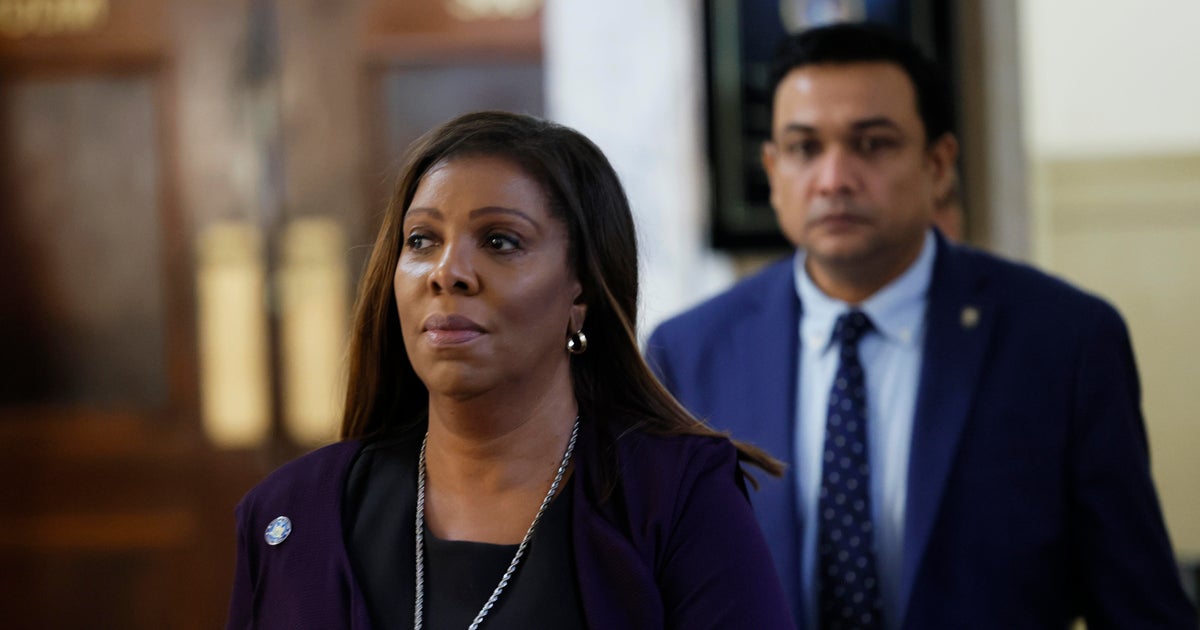Deported man's wife and friends rethink voting for Trump
- Roberto Beristain, who has no criminal record, was deported after illegally coming to the U.S. nearly 20 years ago. His wife and children are U.S. citizens.
- The number of people caught trying to cross the Southern border has dropped 60 percent in the first three months of President Trump's administration.
- Analysts believe President Trump's new policy has deterred illegal border crossings, but so have other factors, including an improving job outlook in Mexico.
President Trump promised he'd crackdown on illegal immigrants, and in his first 100 days, has moved quickly to do just that. Since the president took office, the U.S. Immigration and Customs Enforcement agency -- ICE --says it's arrested 21,000 undocumented immigrants, more than 5,000 of whom have no criminal record. That's more than twice as many as the year before. The president's supporters argue his tough new policy has led to a dramatic drop in the number of people trying to cross into the U.S. this year, but it's also had a profound effect on communities throughout the country. For the past few weeks, we've followed how the new policy has played out in one community in Indiana, where people were surprised to learn that one of those deported was a friend and neighbor, the owner of a popular local restaurant. He'd lived in this country for nearly 20 years, had no criminal record, and his wife and children are all U.S. citizens.
"I voted for [Trump] because he said he was going to get rid of the bad hombres. Roberto is a good hombre." Dave Keck
Eddie's Steak Shed in Granger, Indiana, is a local institution – it's a family-run restaurant, where generations of Hoosiers have come for conversation and cholesterol.
Anderson Cooper: It seems like this is, like, your local "Cheers"?
Group: It is. It is.
But as we spoke with these regulars a few weeks ago, the man they said was the heart of the business, its longtime cook and new owner Roberto Beristain, was behind bars, awaiting deportation. Beristain entered the U.S. illegally from Mexico in 1998, but in recent years he'd been issued a temporary work permit, a social security number, and a driver's license.
Kimberly Glowacki: It just feels wrong.
Michelle Craig: The community is better for having someone like him.
Matt Leliaert: I mean, he showed up here with just the shirt on his back and he's a restaurant owner 20 years later. I mean, that's-- and he worked his butt off to get there, I've seen it.
They're all strong supporters of Roberto Beristain, though four out of six of them voted for President Trump.
During the primaries, the president said this about illegal immigrants:
Trump in debate: They will go out. They will come back-- some. Some will come back, the best, through a process and it may not be a very quick process…
And later, during the general election, he said this:
Trump: But we have some bad hombres here and we're gonna get'em out.
Dave Keck: I voted for him because he said he was going to get rid of the bad hombres. Roberto is a good hombre.
Roberto Beristain's wife, Helen, who also works at the restaurant, was born in Greece and became a U.S. citizen 16 years ago. She met Roberto in 1998, at another restaurant in Fort Wayne, Indiana.
"[Roberto's] not a criminal. The only bad thing he's done is stayed in the United States because he loves this country. That's his only crime." Helen Beristain
Helen Beristain: He was a busser, and I was a server. He started talking to me a lot, and I tried to ignore him. He kept on talking to me—
Anderson Cooper: And you tried to ignore him?
Helen Beristain: Smiling and smiling and smiling. He always smiles, very positive person.
They got married, had three kids, and settled into a comfortable suburban life.
Anderson Cooper: Has he ever been in trouble with the law?
Helen Beristain: Never-- never.
Anderson Cooper: Never committed a crime, D.U.I.
Helen Beristain: Definitely not, no.
Anderson Cooper: He's not a criminal.
Helen Beristain: He's not a criminal. The only bad thing he's done is stayed in the United States because he loves this country. That's his only crime.
According to most estimates, there are about 11 million people living within the U.S. illegally; about three percent of them have felony convictions.
Obama speech: "We prioritize criminals, we prioritize gang-bangers."
For most of his presidency, Barack Obama ordered ICE to focus on deporting people convicted of felonies and serious misdemeanors. ICE agents were often asked to explain their decision to remove anyone else, particularly those whose family members were U.S. citizens.
But on his fifth day in office, President Trump signed a new executive order that made it easier to deport people who have no criminal record, including anyone who has what's called "a final order of removal" against them. It's that wording that changed the Beristain's lives.
That's because 17 years ago, Roberto and Helen, who was pregnant with their first child, took a trip to Niagara Falls. She says they made a wrong turn, and ended up near the Canadian border. Roberto was detained for not having any papers. He was released only after he agreed to this immigration court order requiring his "voluntary departure" from the United States within 60 days. When he didn't leave, he automatically became the subject of a "final order of removal" which mandated he be deported.
Anderson Cooper: Your husband did break the law. Didn't-- didn't leave the country when he had told a judge that he would. Why should he get special treatment when other people who've been waiting in line are trying to do it the right way?
Helen Beristain: My husband, first of all, broke the law because at the time when I was pregnant, I was very ill. And it was-- a high risk, either losing the baby or losing my life so the decision he had to make was between me and the baby or him going back to Mexico. He chose us. But any other man, what would they do in his shoes?
Helen says over the years they've spent more than $45,000 hiring attorneys to try to legalize Roberto's status. But it wasn't until three years ago, that things started looking up for the Beristains. Roberto obtained a temporary deferral of that deportation order, which meant he could get a work permit, a social security number, and a driver's license. All he had to do was check in with the government once a year and prove he'd been in no trouble with the law.
Helen Beristain: He was excited. He says, "I'm all legal now. I'm so good to go."
Anderson Cooper: But it was still just a temporary status. He still had to check in with ICE every year.
Helen Beristain: Right, exactly.
On February 6th – shortly after President Trump signed his new executive order – Roberto Beristain came here to an immigration office in Indianapolis for his annual check-in. Helen was in the parking lot waiting, when an ICE officer came to let her know: her husband would not be coming home.
Helen Beristain: He said, "Your husband is being detained because he is a fugitive." I said, "My husband is a fugitive? My husband is not running from you. You didn't not come knock on my door to look for my husband. He came to you. Why this year he is a fugitive? What happened?"
Michelle Craig: Roberto was doing everything he was supposed to do, so he was an easy target.
"...we have an obligation to enforce the law. And if somebody comes across our path who's broken the law, then you know what, they're probably going to go..." James Carafano
Anderson Cooper: He wasn't hiding, he wasn't living in the shadows…
Michelle Craig: He wasn't hiding, right. And so they grabbed somebody who was following the rules.
Anderson Cooper: Most of you voted for Donald Trump. He said he was gonna do this, he's done this. Why are you surprised?"
Michelle Craig: Because this is not the person he said he would deport.
Dave Keck: And why would you deport somebody like that when you got so many other bad people out there? It just doesn't make sense to me.
ICE declined to give us an interview, but in a statement the agency said Beristain was detained because of that final order of removal "in accordance with federal immigration law." James Carafano, a policy expert at the Heritage Foundation and a member of Mr. Trump's transition team, told us the president's new policy is designed to serve as a deterrent.
James Carafano: It's not that they're going out and they're looking for people who have done nothing. But that we have an obligation to enforce the law. And if somebody comes across our path who's broken the law, then you know what, they're probably going to go, 'cause the message is, "There's a new sheriff in town. And the law's going to be enforced."
Anderson Cooper: You're saying that deporting somebody like Roberto Beristain, it does send a message to others who may be thinking about coming here illegally?
James Carafano: I think that's absolutely true.
The number of people caught trying to cross the Southern border has dropped 60 percent in the first three months of President Trump's administration. Apprehensions are now at a 17-year low. Analysts we spoke to believe the president's tough new policies have discouraged border crossers, but so have other factors, including an improving job outlook in Mexico.
The average cost of deporting someone like Roberto Beristain is about $11,000. His odyssey through the immigration detention system gives you some sense why: over the course of two months, he was moved from Indianapolis to Brazil Indiana, Kenosha, Wisconsin, Kankakee, Illinois, New Orleans, Louisiana, Chaparral, New Mexico, and Sierra Blanca and El Paso, Texas. His family often didn't know where he was going, or why he was being moved there.
Helen on phone with Roberto: Tell me something, did they tell you when they are going to deport you?
We were at the house one evening when Roberto called….
Helen on the phone with Roberto: So wait a minute, they said-- no Roberto-- they said they were going to take you to Mexico City…So now they are changing again? …OK, I love you. Be careful. Bye.
Helen Beristain: He sounded scared. So scared, like what's gonna happen to me…
The irony of what's happened is not lost on Roberto's wife. Like a lot of her friends and relatives, Helen Beristain also voted for President Trump.
Anderson Cooper: You voted for him.
Helen Beristain: I voted for him. Because he said, "We're going to make our economy better," I did like that idea. And I said to Roberto, I said, "You know what? You know, you're getting a small business. And that's gonna help you with your taxes," but he said, "OK, well you don't think he's gonna deport us, all people?" And I said…
Anderson Cooper: Roberto actually raised that idea?
Helen Beristain: Yeah, he did. And I said, "Roberto, come on now. You've got your documents. You obey the law. You haven't done anything bad. You-- you're not a criminal."
Anderson Cooper: Are there times when you feel that you made a terrible mistake?
Helen Beristain: Like they say, "You should read the fine print first before you make a selection." I should have listened closely to those debates. That was a mistake I made. I didn't listen.
The Beristains'children – 8-year-old Demetri, 14-year-old Jasmine, and 16-year-old Maria -- have a difficult time understanding what's happened to their father.
Anderson Cooper: Maria, did you know he wasn't a U.S. citizen?
Maria Beristain: No. I didn't know.
Jasmine Beristain: He makes this home a home. And he makes a family a family 'cause he's, you know, the father. And when he's gone, when you take that away from a family, it's like it's all going down. Like, for my mom it's very hard. And for us it's hard too.
Anderson Cooper: What did you he say to you when you were talking on the phone?
Jasmine Beristain: The first thing he said was, "You got A's?"
Anderson Cooper: He was asking you about your school?
Jasmine Beristain: Yeah. I'm like, "Yeah." And he's like, "OK, good. 'Cause I want you to become a lawyer." I was like, "Yeah, I'll-- I'm gonna become a lawyer." I'll-- an attorney. I'm gonna be an immigration attorney.
Since Roberto Beristain's detention has been in the news, the restaurant has received threatening calls and angry letters directed at Helen: "Pack your bags and go to Mexico," said one. "When you voted for Trump you were voting for every bigot…who is coming after you," said another.
Helen Beristain: You got people hating people left and right. This is not America. This is not the American dream. And this is how, this is not how we're making America great again.
On April 4th at 10 p.m., Roberto Beristain was taken to this border crossing and deported to Juarez, Mexico. He spent the night at a shelter run by the Catholic Church. We found him there the next morning. He told us he was praying to be reunited with his family, and was still, somehow, optimistic:
Roberto Beristain: Wherever I go, they are going to be with me. Everything is going to be OK. Either way or other way, we are going to be together.
Michelle Craig: If I was told that peaceful immigrants that are trying, are in the process of becoming an American citizen would be deported, I would not have voted for Trump.
Anderson Cooper: Some people say, "Look, illegal immigrants are coming here and they're taking jobs".
Kimberly Glowacki: That's not even the case with Roberto. He employs, what, 20 people--he's not taking jobs, he's creating jobs.
Anderson Cooper: Is it a good use of resources to deport someone like Roberto Beristain?
James Carafano: That is part of the overall public good of demonstrating not just to Americans but to people around the world that American immigration laws are going to be enforced. That's an important message.
Anderson Cooper: So there's no room for discretion?
James Carafano: I mean, I-- look, I don't enforce the law. I don't say where there is room for discretion. I'm saying, I don't necessarily think that just because somebody was, you know, nice in the 20 years they live here that they have a right to live here.
Roberto Beristain's lawyers are challenging the validity of that old "order of removal" that led to his deportation to Mexico. They may also apply for a special waiver for him to re-enter the U.S. but that can take two to three years. If he's denied, he'll be banned from returning for a decade.
Produced by Andy Court and Sarah Fitzpatrick. Alex J. Diamond, associate producer.
